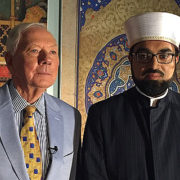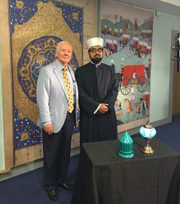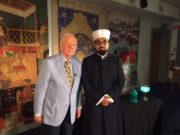Shaykh Umar al Qadri’s father took his family from to the Netherlands when Umar was two, but he still doesn’t speak Dutch. His son thinks that’s a failure and a wasted opportunity. People of different cultures need to meet and mix to understand one another. Integration is no threat to your religious or cultural identity, if you know who you are. So, who is Umar al Qadri?
Still only in his mid-thirties, he first captured attention in Dutch Muslim circles when he memorised the entire Qur’an by the age of 11. By his mid-teens, however, his parents had grown fearful about him becoming too much like other Dutch teenagers and packed him off to an Islamic school in Pakistan. Instead of resenting the move, Umar embraced it, developing a deeper and more mature understanding of his faith to go with all the previous rote-learning. On returning to Europe, he again turned heads with his ability to communicate his Muslim faith in a compelling and accessible way.
He’s an accidental Irishman. He came here, because, after his arranged marriage, the Dutch consulate in Pakistan was closed. He wanted his new bride to be able to join him in Europe and Ireland welcomed them both. They are proud to be raising their children here.
They soon opened the living room of their north Dublin home as an English-speaking mosque and it became a magnet for Muslims of many nationalities. So much so, that it is now based in an industrial unit in Blanchardstown, with hundreds in regular attendance.
The Shaykh’s willingness to engage with media and with the Irish public of all faiths and none quickly raised his profile, but it was when he took to the streets to condemn violence carried out in the name of Islam by so-called ISIS – in Tunisia, Paris, Belgium and elsewhere – that he really caught people’s attention. Not all of that attention was positive, either. He and his followers have been confronted and threatened by less moderate elements in Ireland’s diverse Muslim community, but he remains undaunted. He tells Gay that, to him, the violence carried out by ISIS in the offices of Charlie Hebdo, for instance, was a much worse sacrilege than anything contained in the magazine.
“They are trampling upon the instructions of the prophet Muhammad. They are committing blasphemy… I personally don’t get so angry at the caricatures made by Charlie Hebdo about the prophet Muhammad. I disagree with them. I’m heart-broken and saddened by them. But I get more angrier [sic] when I look at these people that, in the name of Islam, are trampling upon the teachings of the prophet Muhammad, peace be upon him, by killing in the name of Islam, by chopping heads off people, by demolishing churches, by persecuting Christians. The prophet Muhammad… told his followers: always be kind to the Christians, because the Christians are you brothers in faith. And we see these extremists persecuting Christians in Muslim majority countries. That is what is blasphemy, in my opinion.”
For information, stills and preview copies, please contact Fergus.mccormack@rte.ie / 086 867 4751




